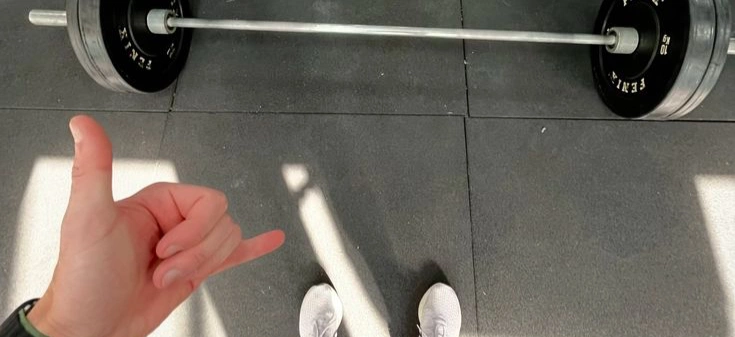Goal Setting Posts on Crowch
Sometimes, stress doesn’t feel like anxiety or panic. It lives more quietly — in the body. We often miss it because we’re used to ignoring signals: “It’ll pass,” “I’ll push through,” “Now’s not the time.” But the body remembers everything. And if we don’t listen, it starts to speak louder.
Stress shows up in many forms: tightness in the neck and shoulders, stomach pain, digestion issues, tension, headaches, insomnia, fast heartbeat. There may be no clear reason — but the body is worried. Because the nervous system is overloaded. Because we don’t allow ourselves to truly rest.
Many of us are great at being productive, fast, multitasking. Few of us are good at pausing without guilt. Even rest becomes another performance — “useful downtime,” self-improvement, productivity in disguise. The body gets tired — not just from doing, but from constantly being ready. From never hearing: “It’s okay now. You’re safe. You can exhale.”

When we start listening to the body, we learn to notice stress before it turns chronic. This isn’t weakness — it’s care. It’s respect. It’s the honesty of saying: “This is too much, and I don’t have to carry it all.”
What helps? Simple, body-based practices:– slow, extended exhaling– stretching or yoga just for comfort, not performance– warm showers, massages, safe physical contact– walking without a podcast– sleeping without guilt– physical touch — with yourself, someone you trust, or nature

Sometimes, caring for the body doesn’t mean the gym, perfect food, or strict routines. It means presence. Gentle, patient, real attention. Not improving, just being. And that’s often where healing begins — not with getting stronger, but with coming home to yourself.
Being a leader isn’t about being first. It’s about being the one who acts first. The one who invests energy when no one else believes. The one who sees potential when others see only problems. The one who listens when it would be easier to command. The one who sets the pace before it becomes comfortable. Leadership isn’t about control — it’s about moving forward, even when the path is unclear.
Today’s world no longer responds to authoritarian leadership. People don’t want bosses — they want partners they can grow with. A modern leader isn’t the top of a hierarchy, but a point of strength. They don’t assert authority — they help others find their own. They don’t say, “I know how,” but instead ask, “How would you do it?” They’re not afraid of different perspectives, because they understand that diversity is a resource, not a threat.
One of the key signs of real leadership is the ability to create an environment for growth. Not just assigning tasks, but supporting the process. Not just demanding results, but helping people get there. Leadership isn’t only about outcomes — it’s about evolution. When the people around you start to think bolder, speak more honestly, and believe in themselves more — that’s when you’re not just managing, you’re truly leading. And that’s the essence of leadership.
A strong leader isn’t afraid to take a step back so that someone else can step forward. They don’t compete with the team — they create conditions where the team grows stronger than the leader. That’s true maturity. A leader knows their goal isn’t to be indispensable, but to build something that thrives without constant control. Their role is not to be needed — but to build resilience.

A true leader thinks horizontally. They don’t just look at short-term wins, but long-term consequences — one, three, even ten years ahead. They think in meaning, not just metrics. They understand that quick wins are useful, but direction matters more. They ask hard questions and are comfortable waiting for the real answers.
Another vital leadership trait is the ability to slow down. In a world obsessed with speed and multitasking, pausing can be a superpower. Holding inner stillness while everything outside is in chaos — that’s rare and deeply valuable. And it’s from this inner calm that real decisions emerge.
A leader is not a hero. They are the person who chooses to carry more than they have to. It’s not always about success — often, it’s about resilience. The ability to keep going when no one is watching. Staying loyal to themselves and to others, even when it’s hard. Showing up every day with a quiet “I’m here,” when it would be easier to step aside.

These are the leaders who shift the energy in teams, projects, and lives. Not because they tell others what’s right — but because they show what’s possible.
We live in a time where we’re surrounded by voices. News, notifications, calls, podcasts, videos, ads. We’re told what to think, what to feel, how to react. And even when we turn the screen off, the noise lingers in our minds.
Silence has become a luxury. A rare one. But silence isn’t just the absence of sound — it’s a pause where we can finally hear ourselves.It’s not emptiness — it’s space to breathe.
Information overload is more than background static.It’s a source of anxiety, fatigue, distraction, and the constant sense that we’re falling behind.We absorb too many voices and slowly lose touch with our own.

We fear silence because it leaves us alone with ourselves. But in that quiet, something honest begins to emerge — the truth of what we really feel, think, and need.
Society encourages constant speaking. Posting. Sharing. Reacting.But maybe the boldest thing we can do today… is choose not to respond.Not to argue.Not to explain.But to pause.To breathe.And to ask: “What do I actually feel? What is truly mine?”

We have the right to silence.The right to turn off notifications.To not reply immediately.To go offline.To just be.
Because only in silence do we start to hear what really matters.
The modern world teaches us to move fast. Do more. Earn faster. Keep learning. Build your career, grow your brand, update your resume, stay visible. But the faster we run, the more often we find ourselves feeling empty. Where are we rushing — and why?
The world may be accelerating, but the human mind is still wired for rhythm, not chaos. We are not machines. We are not built for endless momentum without pause. Our internal resources — focus, energy, inspiration — are not infinite. Yet we’ve learned to ignore fatigue. We fear slowing down: afraid we’ll lose momentum, relevance, or our place in the race. And that’s the trap.
More and more people today are realizing that old models of success are failing. Growth for growth’s sake, income for metrics, busyness as identity — these patterns leave us exhausted, anxious, and numb. We look successful on the outside, but feel disconnected within.
Rethinking success begins with slowing down.
To slow down doesn’t mean to quit. It means creating space to think — not just produce. To return to essential questions:— What actually matters to me?— Where do I draw meaning, not just motivation?— What pace is truly mine — not what’s imposed?

We often fear being “slow” in a culture obsessed with speed. But it is in slowness that depth is born: ideas, relationships, insights, honesty. Everything real takes time. Speed is for consuming. Creation is slow.
Real strength today isn’t in acceleration. It’s in choosing your own rhythm. It’s in pausing, saying no, noticing, feeling, being fully present. Success isn’t a timeline. It’s a resonance between what you do and who you are.

Sometimes, to return to yourself, you just have to stop.Not to fall behind — but not to lose yourself.
Sometimes it hits without warning — in the middle of a normal day, during tasks, in silence.Your chest tightens. Your thoughts race. Something feels wrong — but you can’t explain what.
Anxiety often speaks in the voice of fear:You’re falling behind.You’re not enough.Everything is about to fall apart.You won’t be able to handle it.
And the more you fight it, the louder it gets.Because anxiety feeds on control.It grows when we try to silence, suppress, or outthink it.
But truth — real truth — is quieter.It doesn’t shout. It whispers.
It says:You don’t need to have everything figured out.You’ve made it through before — you will again.You’re allowed to be scared and still keep going.You’re not alone.

When anxiety rises, the answer isn’t to escape — it’s to return.To come back to yourself. To pause. To breathe.To ask: What do I need right now?
Sometimes it’s stillness.Sometimes it’s warm tea.Sometimes it’s someone who simply says: I’m here.
You don’t have to be unshakable.Life isn’t about control — it’s about connection.It’s about remembering how to return to yourself — again and again.You’re not broken.You’re feeling.And that means you’re alive.And that… is enough.
Anxiety craves clarity where there is none yet.It wants to know the outcome.It struggles to sit in the “I don’t know.”But this is where growth begins — not in certainty, but in presence.

You are learning not just how to cope — but how to stay with yourself.Not to demand, rush, or criticize.But to accept.To support.Sometimes that’s the bravest thing: to remain with yourself when every part of you wants to run.
Not every day will feel easy.Not every feeling will make sense.But every part of you deserves your presence — not your judgment.
You don’t need to be strong to be whole.Your vulnerability is not weakness — it’s your depth.Your truth.
And even when the storm rises inside — your anchor is still there.It’s you.
We live in a time where success isn’t just a goal — it’s a social expectation. If you’re not growing, building, launching, improving — it feels like you’re falling behind. Social media sets the pace: every day someone is buying a house, moving abroad, starting a business, writing a book, running a marathon. And there you are — sitting quietly, drinking tea, staring out the window — and somehow feeling guilty. Guilty for being okay. For simply being.
We’ve confused worth with productivity. Meaning with performance.But real life doesn’t measure itself in likes, speed, or visibility.It’s felt inside — in the quiet moments when you feel grounded. When you’re honest with yourself. When you’re not performing — you’re living.

Chasing success, we often stop feeling. We turn ourselves into a brand, a project, a plan.But you’re not a pitch deck. Not a strategy. Not a glossy result.
You are a person. Human. Complex. Complete — even when you don’t fit someone else’s timeline.Your value is not tied to your output.You have the right to pause. To change your mind. To rest. To start over. To post nothing. To just be.

True freedom doesn’t come when you “make it.”It comes when you stop chasing.When you reclaim your right to slow down, to disconnect, to live simply — even when no one is watching.
Strength doesn’t always look the way we imagine. It’s not always a loud voice, a confident walk, or a perfectly laid-out plan. Sometimes, strength is simply continuing to move forward while everything inside feels like a storm. It’s smiling through the anxiety. It’s choosing to get out of bed in the morning when all you want is to hide from the world.
Strength is honesty. The ability to say, “I’m struggling right now,” without pretending, without performing — just breathing in your own rhythm, staying true to your own pace, and being real.
We often forget how much we’ve already been through. How many times we’ve started over. How many times we’ve held on when no one knew how hard it was. Inner strength is quiet. It doesn’t seek recognition. It simply carries you — again and again — even when you feel like there’s nothing left to give.
Change can be terrifying. Especially the kind we didn’t choose — loss, uncertainty, unexpected turns. When the ground shifts, and familiar things fall away. But it’s in those moments that something hidden begins to surface. And what is truly yours never disappears — it stays within you.
Strength is flexibility. The ability not to break, but to bend. To sit with pain instead of running from it. To soften without falling apart. To remain open without being defenseless. That’s not weakness — that’s emotional maturity.
Every crisis is a crossing. Like a bridge between one version of your life and the next. And if you find yourself on that bridge now, remember: it’s not forever. Yes, it may feel scary. But fear doesn’t mean stop — it means you’re stepping beyond what’s familiar.
Inner strength doesn’t make you hard — it makes you alive.It teaches you how to hold boundaries while still staying soft.How to trust yourself even when the world around you is filled with doubt.Strength isn’t about being fine all the time. It’s about coming home to yourself, even when things are falling apart.

You’ve already come through so much — more than you probably realize.And you’ll go further. In your own way. In your own time. With what truly matters.
You don’t have to be strong every day.But know this: your strength is always with you.Even when you cry. Even when you’re silent. Even when you’re just breathing.

Sometimes, being strong simply means staying true to yourself.Not abandoning who you are. Not forgetting what you carry.And the rest — will come.It always does.